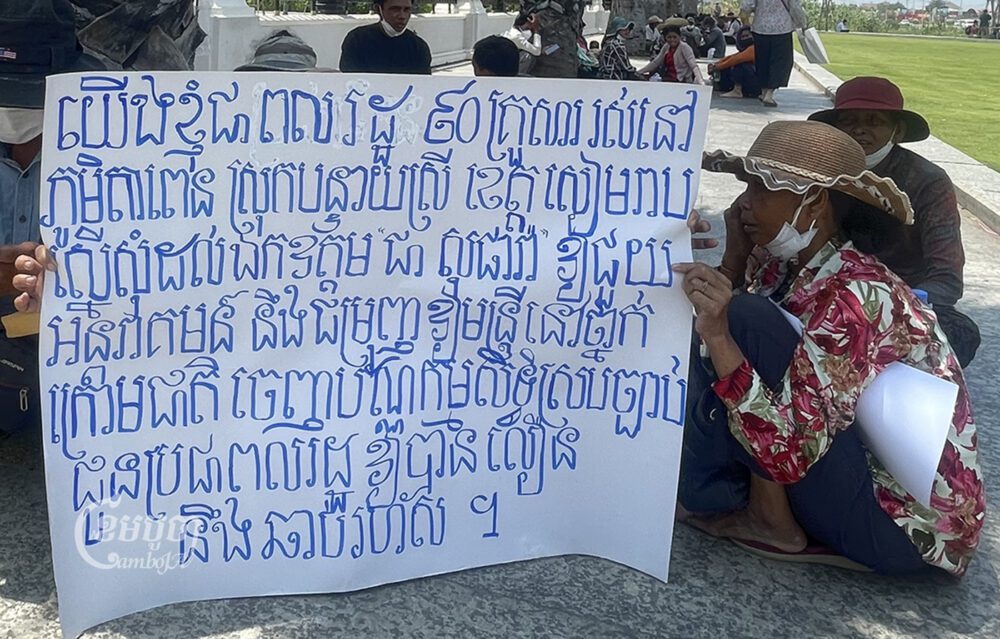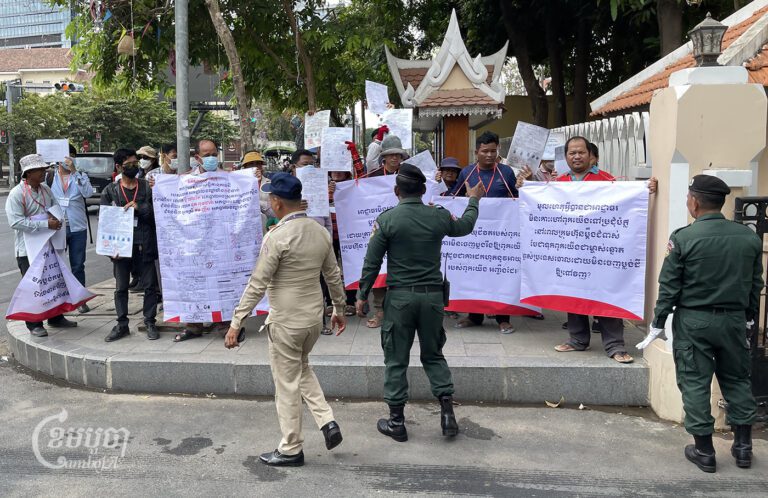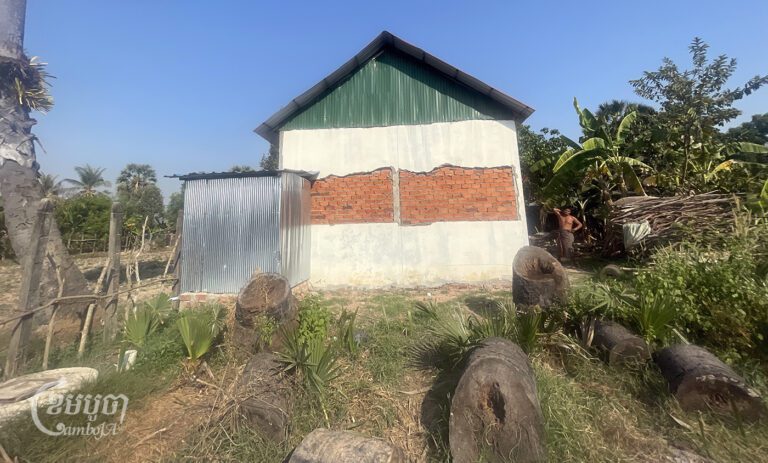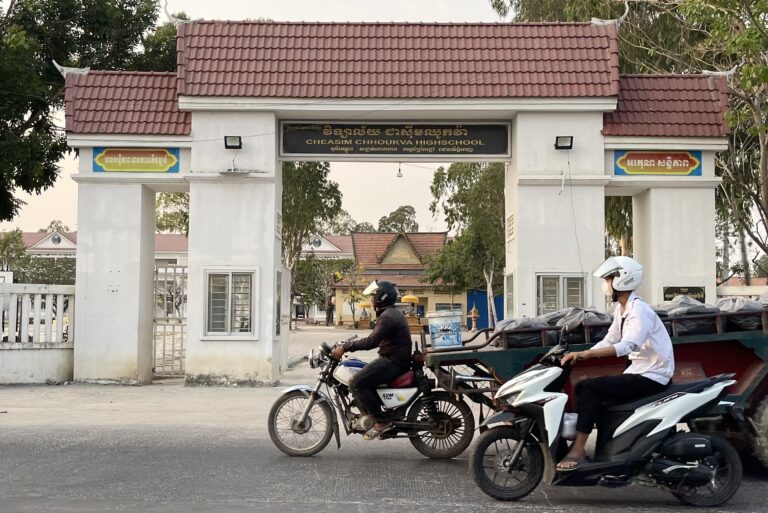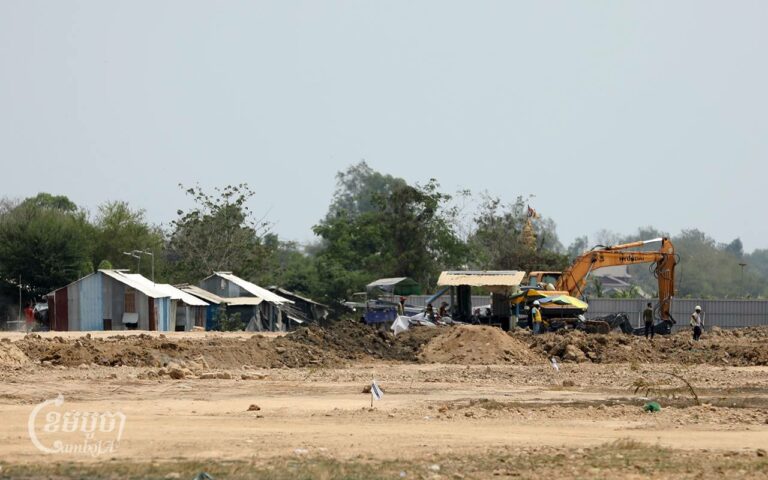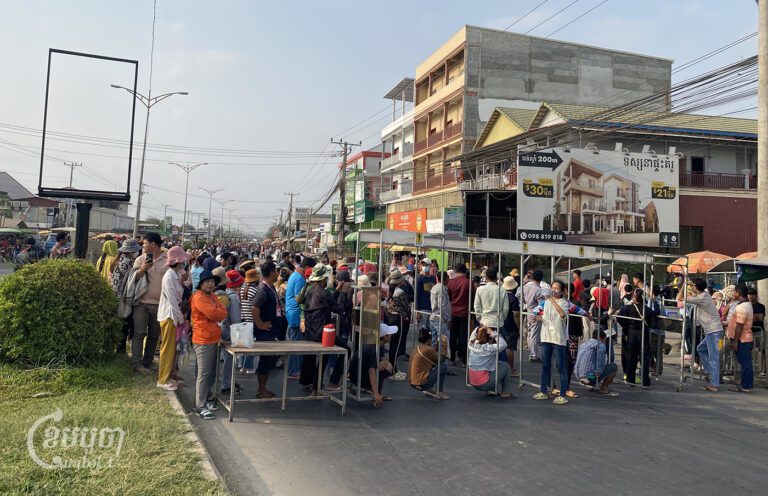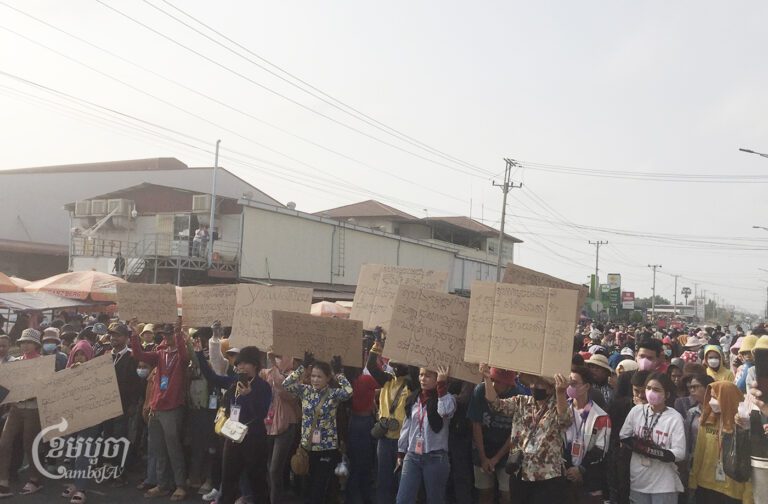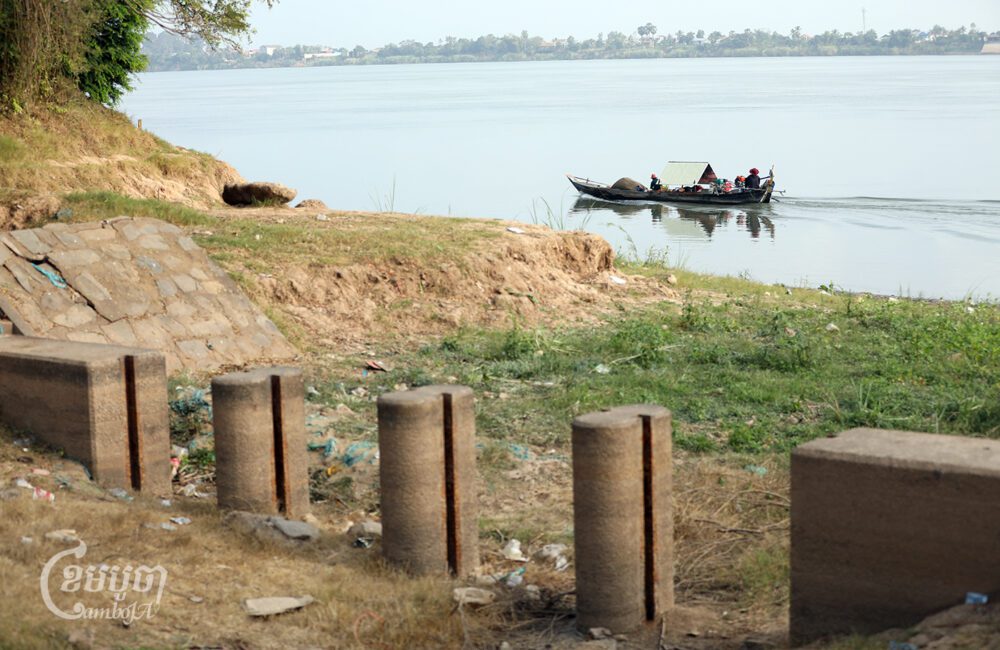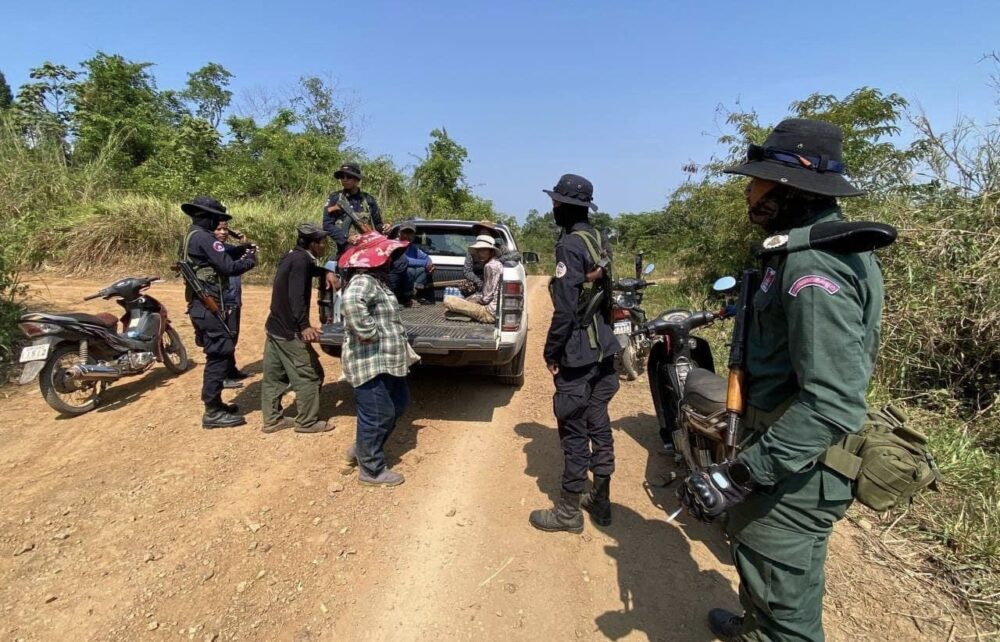Around 100 villagers representing thousands of families from seven Siem Reap communities facing land conflicts delivered petitions to relevant ministries in Phnom Penh, requesting land titles and solutions from provincial and national authorities this week.
The community representatives, who arrived in Phnom Penh on Monday afternoon, said 4,206 families have been negatively affected by land disputes and allege the government failed to provide land titles, including to families living inside the Angkor Archaeological Park, home to the Angkor Wat. The families said government agencies, including the Forestry Administration and Apsara National Authority managing the Angkor temples, have barred them from fish farming and other activities needed to support their livelihoods.
The petitions were delivered to the Ministry of Land Management, Ministry of Interior, Ministry of Defense and Prime Minister Hun Sen’s cabinet.
Chean Tha, an Angkor Thom community representative in Leang Dai commune, said her neighbors have faced challenges. While thousands of people inside the Angkor Archaeological Park have been displaced on conservation grounds, Tha’s community has been allowed to stay but with restrictions. Apsara authority prohibits them from expanding their houses or digging ponds to raise fish.
“I come here to ask His Excellency [Minister of Land Management Chea Sophara] to inform the Apsara authority that we have difficulty with cultivation like digging ponds for fish farming,” she said. “They have also prohibited constructing on the land to build small grocery shops.”
“My location is not impacted by the evictions, so why can’t I do anything?” she asked.
She also went to the Phnom Penh office of the United Nations Educational, Scientific and Cultural Organization (UNESCO), which designates the Angkor Archaeological Park as a World Heritage site.
While she claimed her petition was not accepted by UNESCO, a UNESCO spokesperson said in an email that three villagers had “talked with the local security guard at the gate for [a] few minutes and then walked away.”
“Whenever anyone comes to submit the petition, we accept the petition for our record/registry and then review it for further action,” the spokesperson said. “Therefore, the petition was not submitted to us. Our communication channels are always open and anyone can write to UNESCO any time.”
UNESCO has had a heavy influence in directing government policy inside the Angkor Archaeological Park. Last year, Prime Minister Hun Sen blamed UNESCO for mass relocations of families and said this was necessary to retain the site’s World Heritage status.
Other areas under Apsara’s management have been inflicted by disputes that communities say remain unresolved by local authorities.
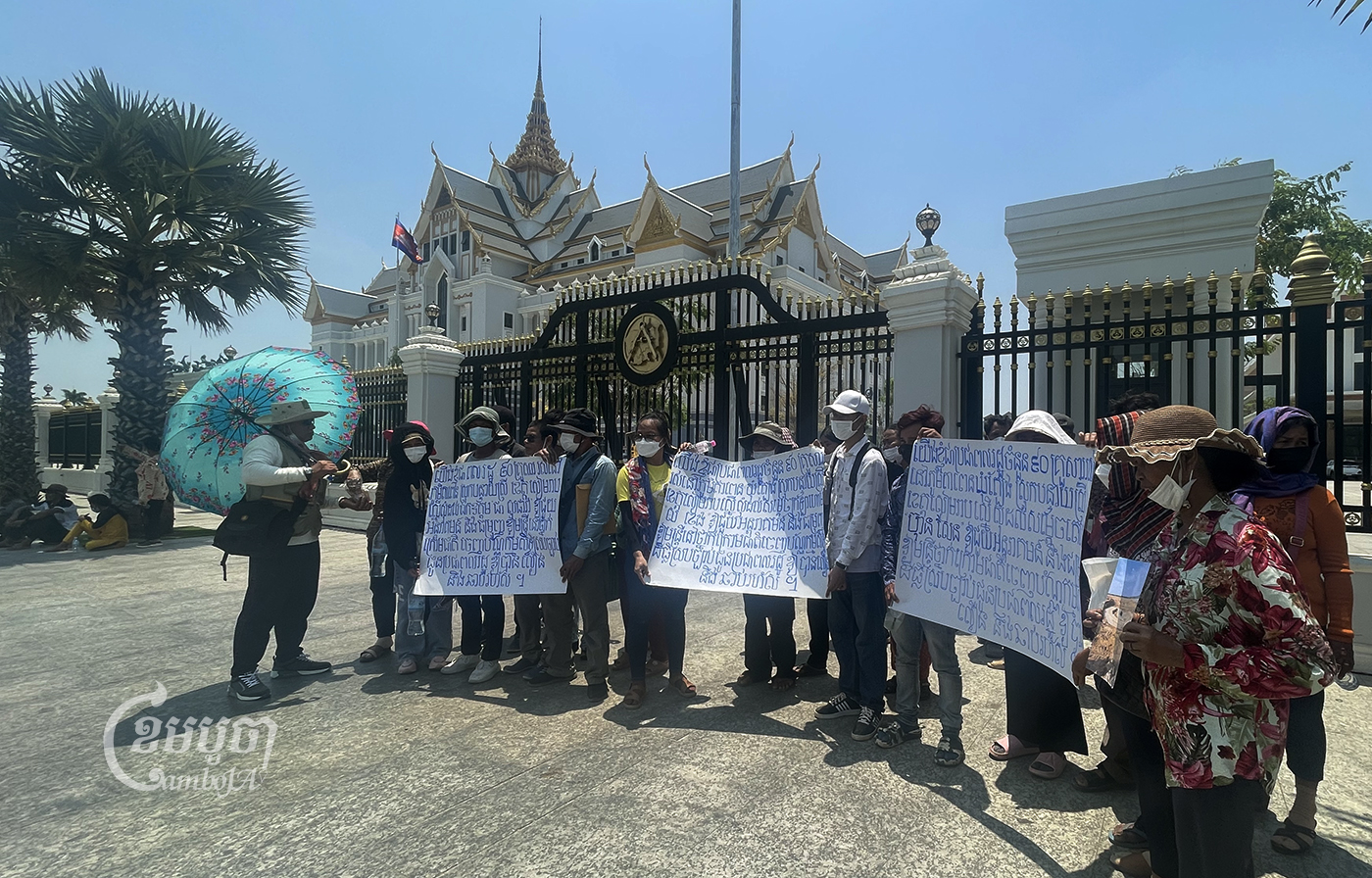
Krom Vet, representative of Phnom Krom village in Siem Reap commune in Apsara’s jurisdiction, said local authorities appear unwilling to fix the long-standing land problems his village faces.
“We have submitted petitions at all authorities’ levels but there was no response, so we came to the ministry for help,” Vet said. “We came here to submit a petition for our land titles because we fear that our land will be sold for their [authorities’] advantage.”
Vet said more than 10 hectares of land in his community was put on sale in 2014 by a well-connected military officer, threatening 104 families with displacement. Vet said the communities had occupied the land since before the Khmer Rouge.
Sun Chamnan, Siem Reap administrative chief, claimed that authorities had already resolved the Phnom Krom communities’ issues by providing families with 7 by 20 meter plots of land elsewhere and the majority had accepted.
“Authorities have already resolved that problem, but some villagers do not accept it because [the plot of land] is a smaller size,” he said.
Apsara National Authority spokesperson Long Kosal denied the agency has ignored communities’ issues. He said that while he could not directly address the issues raised by the petitioners, Apsara is constantly responding to resolve problems raised by villagers.
“I can’t provide information because I do not know their issues,” he said. “They should come here to resolve, not to go to the [Ministry of Land].”
Kosal said that according to data from between 2004 and 2005, there were 19,000 families in 112 villages living in the Angkor Archaeological Park.
“Each person already knows the rules [of living inside the Park], no need to repeat that issue,” said Kosal, who declined to elaborate on the laws because he claimed CamboJA already knew this information and he had previously explained to the media.
Keo Sophy, a community representative from Tapen village inside Banteay Srei district’s Tbeng commune, has occupied 3 hectares of land since 2003. She said the provincial Forestry Administration had revoked 140 hectares of land occupied by 90 families, which was then used to plant acacia trees. After the families protested, they received 93 hectares back and while they received land certificates — locally recognized land occupation but not a nationally recognized land title providing firm ownership security.
“We come to urge the [Land Ministry] to intervene and issue a land title that will not be impacted by a development project in the future,” Sophy said. “It is nine years so far, we are still temporarily holding a land certificate and we are concerned about that issue.”
Land Management Ministry spokesperson Seng Loth said he could not comment because he was busy in a meeting and did not respond to further inquiries from CamboJA.
Siem Reap deputy governor Ly Samrith declined to comment because he was attending a funeral ceremony. General Chhum Socheat, spokesperson of the Ministry of Defense, could not be reached for comment.
Soeng Senkaruna, a senior investigator at human rights NGO Adhoc, said local authorities should expedite the resolution of land conflicts and provide land titles quickly. He added that local authorities lacked the power and were afraid to intervene in land disputes with powerful business interests or high ranking officials, leaving communities vulnerable.
“Usually, when we become an owner of a property, we have enough legal rights to sell or use that land,” he said. “When we have not received land title, our emotions are unsafe and there is a fear people will take their land away.”
(Additional reporting by Eung Sea)
Update: This article has been updated at 10:30 p.m. to reflect comments received from UNESCO after publication. A previous version of the article said that UNESCO had refused to accept a petition brought by villagers.


